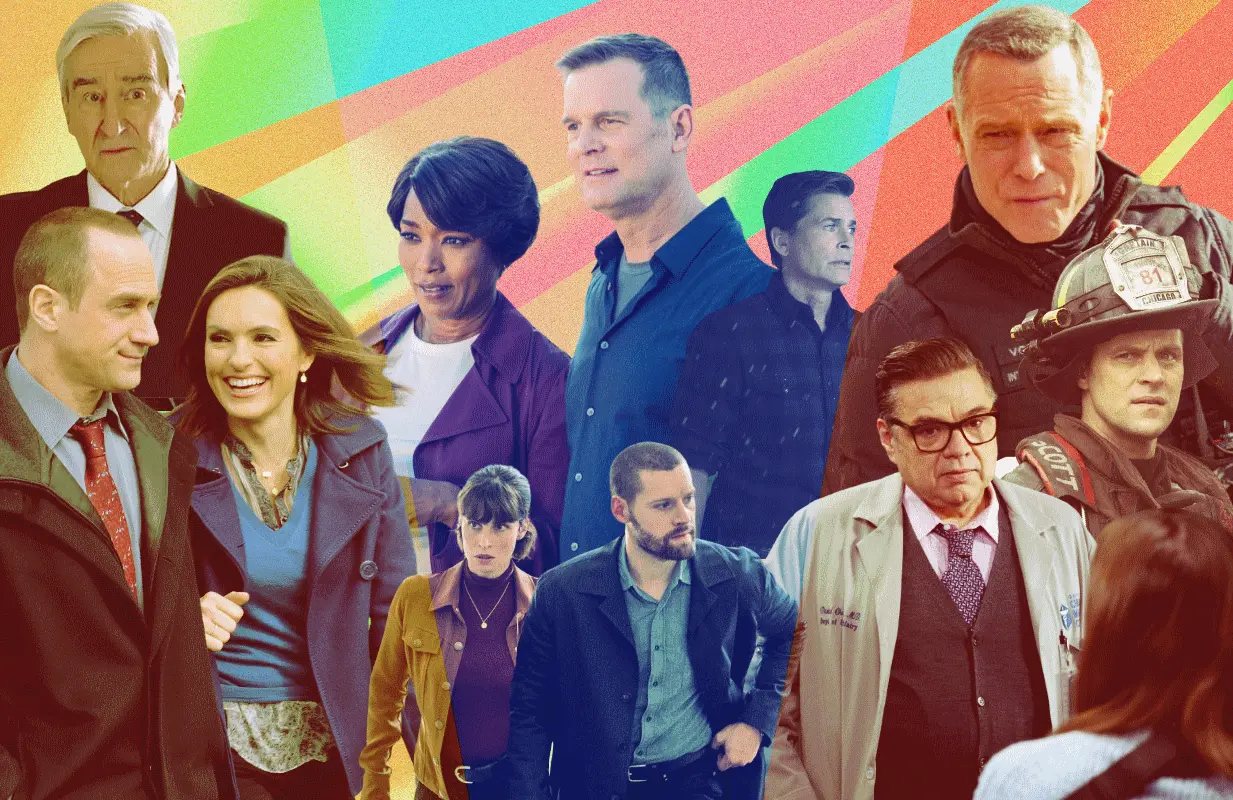Forget Crossover Episodes — Network TV Has Embraced Crossover Nights
-
 Photos: NBC, CBS, Fox.
Photos: NBC, CBS, Fox.You don’t have to be a professional TV watcher to wonder if the big networks we grew up with are … maybe running out of ideas? Wednesday nights NBC has nothing on but shows with Chicago in the title. CBS is all-FBI on Tuesdays. Fans of Law & Order’s signature “lockup” sound effect can hear it chank-chanking for three full hours on Thursday nights.
Since the dawn of television, TV networks have tried every trick in the book to keep viewers from switching away: scheduling four sitcoms in a row, airing similar cop dramas back-to-back, supersizing Dateline and 20/20. Fox has aired cartoons on Sundays for decades. Every now and then a group of hotshots at Fox think the audience might appreciate a live-action comedy on the Sunday schedule. They soon regret their decision.
But what’s happening right now in network TV is different. Shows from the same franchise are airing back-to-back and even back-to-back-to-back on the same night. And at the center of this mass production model, pulling the big lever in the middle of the assembly floor, is the usual suspect: Dick Wolf, the Henry Ford of scripted drama. His Wolf Productions shop is responsible for those three flavors of Chicago, those three FBI shows and, yes, all three editions of the brand that made him, Law & Order. NBC just handed Wolf the last hour of Thursday he wasn’t already producing so that he could bring back the original L&O from the dead.
Tonight, Fox is following suit. As it did last year, it’s making Mondays a back-to-back night for its first-responder franchise 9-1-1, pairing Season 5 of original recipe 9-1-1 with an hour of its Lone Star spinoff. The 9-1-1 shows come not from Wolf Productions but from Ryan Murphy, one of the few producers (alongside Shonda Rhimes) who matches Wolf’s ambition but adds a refreshing unwillingness to stay in his lane.
While Wolf keeps cutting the cookies, Murphy’s ouevre ranges from solid-performing franchises like American Horror Story and American Crime Story to one-offs like Glee, Hollywood and Feud: Bette and Joan, not to mention misses like Ratched and The Politician. Wolf’s procedurals and first-responder shows are predictable, budget-conscious and hidebound in their sensibility. About the most daring thing they’ve done is move a Chicago firefighter from the Chicago Fire series to the Chicago PD series — a crossover character.
Murphy’s 9-1-1 shows honor the tropes of network dramas, yet they have plenty of the outrageous and twisty moments Murphy fans have come to expect. Monday’s spring opener of 9-1-1 does not disappoint: the opening scene, set at a quinceañera, seems to be drifting one way before going an unexpected direction, and the episode’s take on the ultimate LA adrenaline trip — the ’90s movie Speed — is something only 9-1-1 could pull off without looking completely ridiculous. (Or maybe it actually is ridiculous, and that’s why we like it.)
Different though their styles are, both of these megaproducers understand the huge shift in viewer behavior that’s come about thanks to Streaming TV. Basically we now live in a world where all TV is binge TV. Even when we say we don’t like to binge, we’re probably bingeing. Maybe we don’t spend the weekend catching up on an entire season of Grey’s Anatomy, but we might go two weeks without watching anything else.
The binge goes back at least to the heyday of DVRs and DVDs, but the arrivals of Hulu and Netflix moved binge viewing to the forefront. Most of us still have favorite shows that we follow in real time, but those are increasingly the exception and not the rule. Why record a show (or, shudder, watch it live) when the corporate owners of CBS, NBC, Fox and all the big cable channels now have streaming platforms? The prospect of millions of viewers thinking, “Ehhh, I’ll just watch it later on streaming” is the sword of Damocles hanging over every traditional TV network.
And here’s another warning shot across live-TV’s bow: The big growth market in Streaming TV right now are those free, ad-supported platforms like Tubi, PlutoTV and IMDb TV. They, along with Peacock’s free version, offer a simulated channel surfing experience. They take the worry out of deciding what to watch next — just grab the remote, lean back and start flipping. Every channel is themed. You can watch RuPaul’s Drag Race all day if you like, or Star Trek or action films, all for the low price of a mind-numbing parade of commercial breaks. To give credit where it’s due, Streaming TV got this idea from Cable TV. There was a time you could tune in MTV at any time of the day or night and get a Catfish episode. Wait a few weeks and suddenly it’s Teen Mom all the time.
And what Streaming TV has embraced, inevitably the big networks will do as well, if they know what’s good for them. As of this week, four nights of the television schedule have been handed over to a single franchise. In a world of endless options, here are four choices you don’t even have to think about. Is it Wednesday? Then it’s Chicago night. What order do the shows air in? Does it really matter?
Aaron Barnhart has written about television since 1994, including 15 years as TV critic for the Kansas City Star.
TOPICS: 9-1-1, FBI Franchise, Law & Order Franchise, One Chicago Franchise